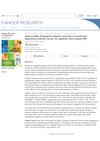 1 citations,
June 2023 in “Animals”
1 citations,
June 2023 in “Animals” CRABP2 helps increase the growth of cells important for hair growth by activating a specific growth pathway.
 1 citations,
February 2017 in “MOJ bioequivalence & bioavailability”
1 citations,
February 2017 in “MOJ bioequivalence & bioavailability” Treating hair loss effectively may require a multi-sided approach, using different treatments together, and topical treatments could be more effective and safer than oral ones.
 1 citations,
August 2024 in “Skin Research and Technology”
1 citations,
August 2024 in “Skin Research and Technology” There is no causal relationship between androgenetic alopecia and serum uric acid.
 1 citations,
January 2017 in “Journal of rare disease research & treatment”
1 citations,
January 2017 in “Journal of rare disease research & treatment” Obesity is common in PCOS patients and early treatment is important for their heart and metabolic health.
 September 2024 in “Genes”
September 2024 in “Genes” CRABP1 boosts hair cell growth in Hu sheep by affecting key genes.
 June 2023 in “Pharmaceuticals”
June 2023 in “Pharmaceuticals” Men and women respond differently to drugs for COVID-19, high cholesterol, and diabetes, which suggests a need for personalized treatments.
June 2020 in “Journal of Investigative Dermatology” The symposium highlighted the importance of genetics in understanding and treating complex skin diseases.
 March 2024 in “Cancer Research”
March 2024 in “Cancer Research” Men with baldness on the top of their head might have a small increased risk of prostate cancer.
January 2010 in “Springer eBooks”  29 citations,
October 2020 in “eLife”
29 citations,
October 2020 in “eLife” Higher testosterone levels can increase the risk of certain diseases like type 2 diabetes in women and prostate cancer in men, but can also protect against autoimmune diseases and hair loss. It also affects body fat and bone density.
17 citations,
May 2020 in “Forensic Science International Genetics” Genetically variant peptides are reliable for forensic identification despite age-related changes in hair proteins.
14 citations,
September 2021 in “Journal of Inflammation Research” Alopecia areata patients, especially women with nail issues or atopic diseases, are at higher risk for other autoimmune diseases.
13 citations,
January 2008 in “Springer eBooks”  9 citations,
February 2022 in “Genes”
9 citations,
February 2022 in “Genes” Women with PCOS have more Bifidobacterium in their gut compared to those without PCOS.
 7 citations,
January 2022 in “Plants”
7 citations,
January 2022 in “Plants” Rice husk and bran extracts from the Bue Bang 3 CMU variety can potentially treat hair loss due to their antioxidant, anti-inflammatory, and anti-androgenic properties.
 6 citations,
August 2022 in “International Journal of Molecular Sciences”
6 citations,
August 2022 in “International Journal of Molecular Sciences” EDA signaling is linked to skin disorders, various cancers, and liver disease.
 3 citations,
September 2023 in “Skin research and technology”
3 citations,
September 2023 in “Skin research and technology” New treatments for skin damage from UV light using stem cells and their secretions show promise for skin repair without major risks.
 1 citations,
October 2022 in “Veterinary pathology”
1 citations,
October 2022 in “Veterinary pathology” Some canine hair follicle tumors contain amyloid deposits, with a protein called CK5 involved in their formation.
 August 2024 in “Skin Research and Technology”
August 2024 in “Skin Research and Technology” Omega-6 and LDL cholesterol increase the risk of hair loss.
April 2024 in “Journal of clinical medicine” Classical PCOS types A and B are most common and linked to higher health risks.
 April 2023 in “IntechOpen eBooks”
April 2023 in “IntechOpen eBooks” Drug repurposing speeds up drug development, saves money, and has led to about a third of new drug approvals.
 May 2022 in “Clinical Epigenetics”
May 2022 in “Clinical Epigenetics” A mother's iron levels early in pregnancy can influence the DNA makeup of her child, potentially affecting the child's health.
April 2024 in “International journal of molecular sciences” Dermal factors are crucial in regulating melanin production in skin.
 April 2024 in “Prostate international”
April 2024 in “Prostate international” Male pattern baldness does not cause an increased risk of prostate cancer.
 March 2024 in “BMC cancer”
March 2024 in “BMC cancer” High levels of ST14 and TMEFF1 proteins in ovarian cancer are linked to worse patient outcomes and may be a new treatment target.
 September 2023 in “JPRAS Open”
September 2023 in “JPRAS Open” Botulinum Toxin A may help with hair growth and has some side effects; more research is needed.
January 2022 in “Stem cell biology and regenerative medicine” Improving dermal papilla cells can help regenerate hair follicles.
200 citations,
August 2009 in “Experimental dermatology” Eating high-glycemic foods and drinking milk may worsen acne by increasing insulin and IGF-1 levels.
 131 citations,
September 2017 in “Molecular and Cellular Endocrinology”
131 citations,
September 2017 in “Molecular and Cellular Endocrinology” The document concludes that blocking the internal pathways that create androgens might help treat cancers that depend on sex hormones.
88 citations,
August 2014 in “PLOS genetics” Syndecan-1 is essential for maintaining skin fat and preventing cold stress.




















